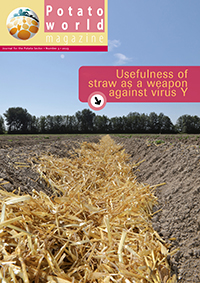Already a subscriber? Activate your premium account

Potatoworld Magazine

Precision agriculture (PA) is a farming management concept based on observing, measuring and responding to inter and intra-field variability in crops. It is a basis for more sustainable farming and highly depending on integration of technologies and knowledge. This column focusses on the state of art and challenges for weed detection and precision implements.
EU’s Farm to Fork (FtF) strategy requires innovative, precision weed control to meet objectives on reduction of pesticide use (-50%), organic farming (at least 25%) and more biodiversity in 2030. Current potato crop management practices rely much on use of herbicides. Are we making enough progress with precision weed control in potato to meet the objectives? How well perform technologies to detect weeds in potato crops. And can they kill single weed plants with high precision in a sustainable way?
Sensor technologies that detect ‘green on brown’ and ‘green on green’ are already used in practice, but they cannot discriminate weed from crop plants and pinpoint individual weeds. Detection of individual weeds in crops with sensor technology and associated detection algorithms are still in the development phase. Detection algorithms are mainly based on artificial intelligence. By e.g. Deep Learning (DL) approaches, a computer trains a detection algorithm using available annotated images of specific weeds in specific crops. Often, this number of images is limiting, slowing down the rate of development. And so, we do not have yet mature whole spectrum weed detection systems in arable farming, despite the many public and private R&D projects on this topic. And do we stick to ‘green on green’ detection and grid application of contact herbicides (with less reduction potential).

A variety of options for precision implements is being developed or applied. On one hand, we see innovative non-chemical methods, such as killing individual weeds by grabbing and pulling, cutting, downward pressing, flaming, freezing, and UV, laser, electrocution treatment. Most of these approaches are in prototype phase. Main challenges are targeting and energy use. On the other hand, we see precision application of herbicides, up to putting individual droplets on single weeds. A challenge here is availability of herbicide active ingredients (a.i.). If we look at current registrations for use in potato in EU, we see ca. 17 a.i. registered (of which 4 are candidates for substitution). Of these 17, at least 7 are for pre-emergence use (soil herbicides), 3 are for potato haulm killing (PHK), and 5 for selective control of grasses in potato. There is only one broad spectrum a.i. for post emergence weed control registered in potato. May be PHK a.i. could broaden the options. For selective grass weed control in potato, there are few options. Overall, the portfolio of a.i. that can be used in precision weed control in potato is limited.
Weed detection and precision weed control will benefit from running on autonomous platforms (field robots) driving through the crop saving labour. If no or little labour is required, low capacity is not an issue. These platforms still require much development to become robust and we have to find ways to integrate them in potato cropping systems. Alternatively, we see drone observations mapping weed plants and smart use of these maps on large scale sprayers. All and all, we still have a long way to go before we arrive at economic, high precision, sustainable, autonomous weed control in potato. But let us end positively. Many parties work hard on aforementioned technologies and applications. Every year we see small progress, e.g. in Lelystad on May 31, 2022, at the Future Farm & Food Experience. Inspiration also comes from successful prototypes for selective control of potato volunteer plants. ●
Dr. Ir. Corné Kempenaar
Wageningen University & Research, and Aeres University of Applied Sciences
Events
©2015 - 2024 Potatoworld | Webdesign and realisation COMMPRO